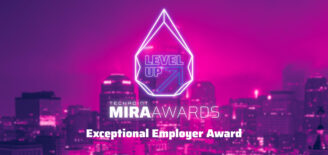When Gen Xers Manage Millennials
Millennials may be the younger siblings of Gen Xers, but they were raised differently, with different expectations from their (usually Boomer) parents. Gen Xers, now in the role of manager to Millennial employees, are finding that their view of work, priorities, and use of time differ from those of their employees.
Gen Xer Landscape
Born between 1965 and 1977, Gen Xers were the last of the “free range” children raised to be independent, take responsibility and get things done in the absence of supervision.
In the economic turmoil of the 1970s and 1980s — during which 40 percent of their parents lost their jobs and/or got divorced — these Gen Xers came home to an empty house, started dinner and had their homework done before their overworked parents got home.
Gen Xers could not call their parents at work for dinner or homework help without getting them fired. As a result, their world view is skeptical and pragmatic, as well as businesslike, realistic and determined. Often the only child or one of two children in the household, Gen Xers are used to working alone.
Gen Xers never had cell phones or emails while still living with their parents and most Gen Xers grew up with fewer than 10 TV stations.
Millennials Landscape
Born between 1978 and 1989, Millennials were the most over-scheduled, highly supervised generation to come along. The economy improved and jobs were more available in the 1990s, so their parents worked fewer hours and became their Millennial children’s “best friends.”
These “helicopter parents” went everywhere with them: school, ballgames, plays, even weekends away at college, and now there are parents who go with their adult Millennial children to job interviews and often want to negotiate job offers and salary increases.
After 9/11, parents wanted to be able to reach their children by phone at all times, so every Millennial had a cell phone and it was (and still is) used for constant parental contact. In the words of a Millennial I know, her parents never told her “no” or any variation of “no.” Helicopter parents tried hard to say “yes” to all requests. As a result, Millennials can be overly optimistic and not particularly inclined to follow policies and procedures.
Millennials are multitaskers who grew up with groups of friends who did everything together and often worked on collaborative projects in school. It can be difficult for them to make decisions without input from parents or friends because of lack of practice.
Millennials are loyal to their managers, not to their company. They have no fear of quitting without another job in hand because mom and dad still have a room waiting for them.
While Gen Xer managers will leave at 5 p.m. to spend time with their families, childless tech-savvy Millennials may come in late or want to work from a café, home or other location, not necessarily between 8 a.m. and 5 p.m.
The greatest challenge for Gen Xer managers is to focus on managing their Millennial employees’ outputs and quality of results, not time at a desk.
It can be a challenge for skeptical Gen Xer managers to provide the level of encouragement and feedback that gives naturally optimistic Millennials confidence and keeps them engaged.
Face time is the secret management tool that retains Millennials.
Gen Xers can command loyalty by encouraging constant learning, modeling desired behaviors and patiently letting Millennials try new approaches.
Wise Gen Xer managers build relationships with their Millennial employees by focusing on areas of commonality such as both generations’ interest in constant learning, project success and community service.
Nancy S. Ahlrichs, SPHR, SHRM-SCP, is an author, a frequent speaker and a business development consultant for FlashPoint, a global talent management consulting firm.





































